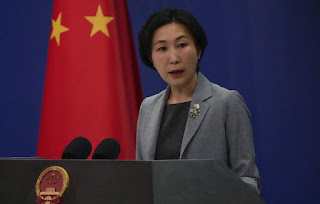©AP Photo/Andy Wong
NATO advancing to the Asia-Pacific region will undoubtedly worsen stability there, Chinese Foreign Ministry Spokeswoman Mao Ning said at a briefing on Thursday.
"NATO’s continued eastward expansion to the Asia-Pacific region and the alliance’s interference in regional affairs will inevitably undermine peace and stability," she said replying to a request by TASS to comment on NATO’s plans to open an office in Japan.
The diplomat emphasized that Asia "should not become an arena of geopolitical rivalry."
Mao Ning added that NATO’s advance in Asia "will facilitate bloc confrontation." "This should particularly concern the countries in the region," she pointed out.
On May 3, Nikkei reported that NATO was planning to open its liaison office in Japan next year. According to the newspaper, "the station will allow the military alliance to conduct periodic consultations with Japan and key partners in the region such as South Korea, Australia and New Zealand." The official decision should be made before the NATO Summit in Vilnius on July 11-12, Nikkei says.
"NATO's continued eastward incursion into the Asia-Pacific and interference in regional affairs will inevitably undermine regional peace and stability and fuel confrontation," Mao said of the possible opening of a NATO liaison office in Japan next year.
In this regard, the Foreign Ministry spokeswoman called on other countries in the region to pay special attention to these destabilizing movements.
On the other hand, and to the question about the alleged assassination attempt on Russian President Vladimir Putin, after a drone was intercepted on Wednesday while flying over the Kremlin, Mao insisted once again that China's position in this conflict is already well known and asked the parties to avoid taking actions that "could further aggravate the situation".
The abbreviation ‘NATO’ stands for the North Atlantic Treaty Organization, but the bloc has recently openly admitted that it also has interests in the Indo-Pacific. Last June, the bloc’s allies from the region participated in the NATO Summit for the first time ever.
NATO is “strengthening relations” with Japan, Australia, South Korea, and New Zealand because “in today’s complex security environment, relations with like-minded partners across the globe are increasingly important to address cross-cutting security issues and global challenges, as well as to defend the rules-based international order,” the bloc said in a statement last month.
Russia, which strongly opposes NATO’s expansion towards its borders, has also criticized the bloc’s attempts to spread its activities into Asia. In March, Russian President Vladimir Putin said that the push by the US and its allies to create what he called a “global NATO” resembled the actions of Nazi Germany, Italy and Japan in the 1930s before the outbreak of World War II.


No comments:
Post a Comment